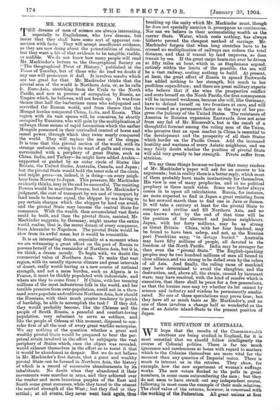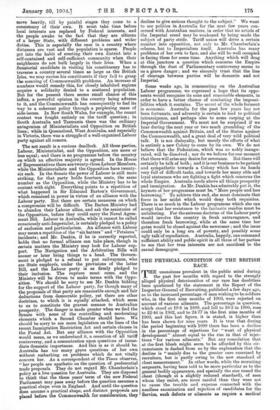THE SITUATION IN AUSTRALIA.
WE hope that the results of the Commonwealth elections are being studied in England, for it is most essential that we should follow intelligently the course of Colonial politics. There is far too much ignorance and carelessness at home with regard to matters which to the Colonies themselves are more vital for the moment than any question of Imperial union. There is much to interest us in the returns. They show, for example, how the new experiment of woman's suffrage works. The new voters flocked to the polls in great numbers, in some cases outnumbering the men ; but they do not seem to have struck out any independent course, following in most cases the example of their male relatives. The chief value of the returns, however, is concerned with the working of the Federation. All great unions at first move heavily, till by painful stages they come to a consistency of their own. It must take time before local interests are replaced by Federal interests, and the people awake to the fact that they are citizens of a larger State, with different problems and. wider duties. This is especially the case in a country where distances are vast and the population is sparse. People get into the habit of erecting their own district into a self-contained and self-sufficient community when their neighbours do not bulk largely, in their lives. When a Senatorial candidate in visiting his constituency has to traverse a country several times as large as the British Isles, we may excuse his constituents if they fail to grasp the meaning of Commonwealth problems. An increase of numbers would remedy this, for closely inhabited. regions acquire a solidarity -denied to a scattered population. But for the present there seems small chance of this influx, a powerful opinion in the country being adverse to it, and the Commonwealth has consequently to feel its way to a coherent policy through a perplexing maze of side-issues. In New South Wale,s, for example, the recent contest was fought entirely on the tariff question ; in South Australia and Tasmania there was the ordinary antagonism of Ministerialists and Opposition on British lines ; while in Queensland,, West Australia, and especially in Victoria, there was a struggle of a well-organised Labour party against all corners.
The net result is a curious deadlock. All three parties, Labour, Ministerialist, and. the Opposition, are more or less equal; -and there is no programme before the country on which an effective majority is agreed. In the House of Representatives there are twenty-three Labour Members, while the Miuisterialists and the Opposition have twenty- six each. In the Senate the power of Labour is still more striking, for that party holds fourteen seats, the same number as the Opposition, while the Ministry has to be content with eight. Everything points to a repetition of what happened in Sir Edmund Barton's Government, which remained in power in virtue of an alliance with the Labour party. But there are certain measures on which a compromise will be difficult. The Barton Ministry had to abandon their Labour allies, and ask the assistance of the Opposition, before they could carry the Naval Agree- ment Bill. Labour in Australia, while it cannot be called consciously anti-Imperialist, is certainly pledged to a policy of exclusion and particularism. An alliance with Labour may mean a repetition of the "six hatters" and "Petsiana" incidents and Mr. Deakin, if he is correctly reported, holds that no formal alliance can take place, though in certain matters the Ministry may look for Labour sup- port. The Navigation and the Arbitration Bills will sooner or later bring things to a head. The Govern- ment is pledged to a refusal to put railwaymen, who are State employs, under the provisions of the latter Bill, and. the Labour party is as firmly pledged to their inclusion. The rupture must come, and the Ministry will be driven to make terms with the Oppo- sition. We should be sorry to see Mr. Deakin bidding for the support of the Labour party, for though many of the proposals of that party are reasonable enough and -fair deductions from democratic policy, yet there are other doctrines, to which it is equally attached, which seem to us to constitute the gravest menace to Australian prosperity. The danger is made greater when we find the Senate with none of the controlling and moderating elements which a Second Chamber should have. We should be sorry to see more legislation on the lines of the recent Immigration Restriction Act and. certain clauses in the Postal Act. But any alliance with the Opposition would mean, as we understand it, a cessation of all tariff controversy, and a concentration upon questions of imme- diate domestic importance. And this is as it should be. Australia has too many grave questions of her own without embarking on problems which do not vitally concern her. As a correspondent of the Times observes, "her people are apathetic on the question of preferential trade proposals. They do not regard. Mr. Chamberlain's policy as a live question for Australia. They are disposed to think that the three years' term of the new Federal Parliament may pass away before the question assumes a practical shape even in England. And until the question does assume a practical shape, and distinct proposals are placed before the Commonwealth ,for consideration, they decline to give serious thought to the subject." We want to see politics in Australia for the next few years con- cerned with Australian matters, in order that no article of the Imperial creed may be weakened by being made the subject of party strife. Tariff union will drive a certain number into opposition, not only to Mr. Chamberlain's scheme, but to Imperialism itself. Australia has many problems of her own to face, and she will be well occupied in facing them for some time. Anything which will at this juncture a question which concerns the Empire through the dust of Parliamentary controversy seems to us a grave danger ; and we sincerely trust that the line of cleavage between parties will be domestic and not Imperial.
Some weeks ago, in commenting on the Australian Labour programme, we expressed a hope that its oppo- nents would recognise its sane and reasonable elements, in order to have a better chance of combating the impossi- .bilities which it contains. The secret of the whole ferment is economic. Australia for the past few years has not been fortunate, and adversity is certain to lead to political intransigence, and perhaps also to some carping at the Imperial Government. We must not be surprised if we hear during the next year or two much grumbling of the Commonwealth against Britain, and of the States against the Commonwealth, and a great deal of very wild political talk. It is not disloyalty, but merely the efforts of what is entirely a new Colony to come by its own. We do not believe that the Federation, which was so nobly inaugu: rated, will be dissolved ; nor do we believe for one moment that there will arise any desire for severance. But there will certainly be talk of both ; and it is our business to be patient and sympathetic towards a Colony which has its hande very full of difficult tasks, and towards her many able and loyal statesmen who are fighting a fight which concerns the whole Empire. Australia needs above all things prosperity and immigration. As Mr. Deakin has admirably put it, the keynote of her programme must be, "More people and less borrowing." To achieve this end, she must dominate that force in her midst which would deny both requisites. There is so much in the Labour programme which she can accept that her resistance to the fantastic residue must be unfaltering. For the extreme doctrine of the Labour party would involve the country in fresh extravagance, and therefore fresh borrowing, while at the same time her gates would be closed against the newcomer ; and the issue could. only be a long era of poverty, and possibly some ugly talk of repudiation. Australia, happily, can command sufficient ability and public spirit in all three of her parties to see that her true interests are not sacrificed to the casual demagogue.























































 Previous page
Previous page